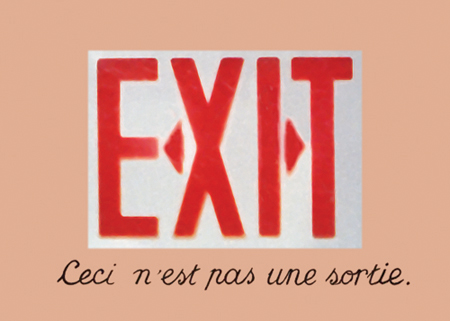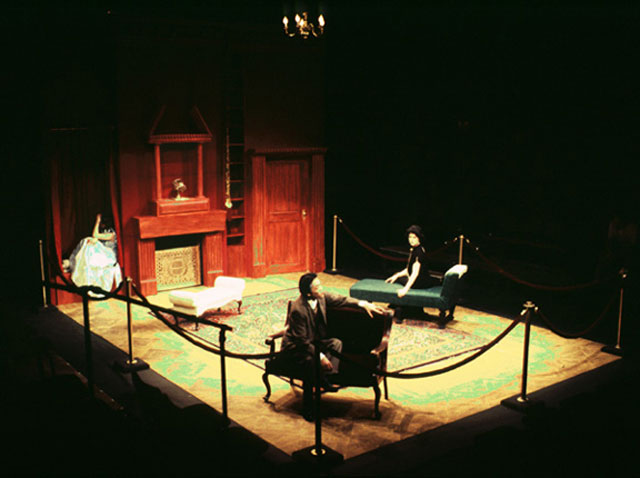JeanPaul Sartre uses his play No Exit to explore many of the existentialist themes discussed in his philosophical treatise Being and Nothingness. Most prominently, No Exit focuses on the ideas of competitive subjectivity, the look and others, objectification, and bad faith. Fantasy Characters: 2 male, 2 femaleScenery: InteriorNo Exit was first presented in New York at the Biltmore Theatre with Claude Dauphin, Annabella, and Ruth Ford. Two women and one man are locked up together for eternity in one hideous room in hell. The windows are bricked up; there are no mirrors; the electric lights can never be turned off; and there is no exit. Analysis of the play Huis Clos or No Exit by JeanPaul Sartre. The dramaturgy in Huis ClosNo Exit, the philosophical base of the play and Sartre's Hell is analysed. Sartres Existentialist Viewpoint in No Exit Akram Amiri Senejani, Sartres Existentialist Viewpoint In No Exit International Journal on Studies in English Language and Literature (IJSELL) Page 17 1945 Jean Paul Sartre delivered a lecture entitled Is Existentialism a Humanism. by JeanPaul Sartre THE AUTHOR JeanPaul Sartre ( ) was born in Paris, the grandnephew of Albert Schweitzer. After completing his studies, he taught for fifteen years, traveled widely, and studied the writings of existentialists Martin Heidegger and Edmund Husserl. NO EXIT AND THREE OTHER PLAYS BY JEAN PAUL SARTRE NO EXIT (Huis Clos) THE FLIES (Les Mouches) translated from the French by Stuart Gilbert DIRTY HANDS (Les Mains sales) I would like [people to remember Nausea, [my plays No Exit and The Devil and the Good Lord, and then my two philosophical works, more particularly the second one, Critique of Dialectical Reason. Then my essay on Genet, John Gerassi, JeanPaul Sartre: Hated Conscience of His Century, Volume 1. Free download or read online No Exit pdf (ePUB) book. The first edition of this novel was published in 1944, and was written by JeanPaul Sartre. The book was published in multiple languages including English language, consists of 60 pages and is available in Paperback format. The main characters of this plays, philosophy story are Garcin, Ines. JeanPaul Sartres Play No Exit Existentialism is a very confusing concept to understand. Existentialism is a school of thought, so to speak, where people believe that for every action there is a reaction. Moreover, most of the time, the reaction is a negative one. There is the basic understanding that humans have free will. No Exit study guide contains a biography of JeanPaul Sartre, quiz questions, major themes, characters, and a full summary and analysis. Read No Exit by JeanPaul Sartre online on Bookmate JEAN Paul Sartre's No Exit was first performed at the VieuxColombier in May 1944, just before. No Exit and the question of other people. This quote by JeanPaul Sartre is one of his most famous. It exemplifies his stance as an existentialist philosopher, and is also one of the most commonly misunderstood quotes in philosophy. Here is an explanation of what Sartre really meant by Hell is other people. The quote comes at the close of the play No Exit (Huis Clos, in French) which. JEAN Paul Sartre's No Exit was first performed at the VieuxColombier in May 1944, just before the liberation of Paris. Three characters, a man and two women, find themselves in hell, which for them is a livingroom with Second Empire furniture. Each of the characters needs the other two in order to create some illusion about himself. Since existence, for Sartre, is the will to project oneself. Watch old movie JeanPaul Sartres No Exit: A BBC Adaptation Starring Harold Pinter (1964) online now. org item description tags) No thanks 1 month free. Jean Paul Sartre, No Exit YouTube Ashraf Jaafar. Loading Unsubscribe from Ashraf Jaafar? JeanPaul Sartre In Our Time BBC Radio 4 Duration. No Exit is a play by JeanPaul Sartre that was first performed in 1944. The book No Exit: Arab Existentialism, JeanPaul Sartre, and Decolonization, Yoav DiCapua is published by University of Chicago Press. In any case this translation of JeanPaul Sartre's No Exit is extraordinary. It captures Sartre's intention while imposing an almost palpable tension. A classic translation of a classic play, I. No Exit by Jean Paul Sartre Although many nineteenth century philosophers developed the concepts of existentialism, it was the French writer Jean Paul Sartre who popularized it. His one act play, Huis Clos or No Exit, first produced in Paris in May, , is the. A students guide to JeanPaul Sartres Existentialism and Humanism in his play No Exit one of the characters declares Hell is other people). Whatever I desire to do, other people or external events may thwart. JeanPaul Sartre Existentialism and Humanism (London: Methuen 1973). Home; Literature Notes; No Exit; Sartrean Existentialism: An Overview; Critical Essays Sartrean Existentialism: An Overview Bookmark this In learning about Sartrean existentialism, it is helpful to recall data about the climate in which Sartre grew up. Analysis of No Exit No Exit by Jean Paul Sartre is a play that symbolizes the German occupation of France. He was a soldier in the French Ar Dr. Michael Delahoyde Washington State University. Sartre, No Exit The traditional reading of JeanPaul Sartre's No Exit, published in 1943, seeks to identify the various tenets commonly associated with Sartrean existentialism, namely that man is an absolutely autonomous individual, determined by his own will alone, for whom his consequent separation from others facilitates infallible liberty. Find great deals on eBay for jean paul sartre no exit. Complete summary of JeanPaul Sartre's No Exit. eNotes plot summaries cover all the significant action of No Exit. Get a plot summary and information about the themes, setting, and main characters of JeanPaul Sartre's No Exit. JeanPaul Sartres Play No Exit Existentialism is a very confusing concept to understand. Existentialism is a school of thought, so to speak, where people believe that for every action there is a. In No Exit Jean Paul Sartre was able to put three different types of people in hell and described the way they expected hell to be and who ends up there. No Exit study guide contains a biography of JeanPaul Sartre, quiz questions, major themes, characters, and a full summary and analysis. In No Exit, Sartre pushes this idea to its extreme, showing how the torture of looking back on our past is a form of Hell, particularly when we fail to choose an act when the opportunity presents itself. If man is alive, he can always choose to rearrange his life, but when he dies, the lifelong events are frozen into a mold which can never be. A short summary of JeanPaul Sartre's No Exit. This free synopsis covers all the crucial plot points of No Exit. nd June 2011 saw the inaugural meeting of the Northern Existential Group (a Manchesterbased version of the Londonbased Society for Existential Analysis discussion group). For our first session we chose to discuss the JeanPaul Sartre play No Exit: a marvellously accessible introduction to the ideas of the French existentialists, and particularly resonant in these days of reality TV shows. Each time I see a reference to JeanPaul Sartres play No Exit (Huis Clos), I think of the nightclub scene in Bret Easton Elliss American Psycho, which is fitting since that novel is, in a sense, about a group of people who hate each other. JeanPaul Sartre ( ) was born in Paris. As a job he became a professor of philosophy. With the help of the Institut Franais he studied in Berlin also philosophy, namely thoughts of Edmund Husserl and Martin Heidegger. Delusion Characters: 2 male, 2 female. No go out was once first awarded in ny on the Biltmore Theatre with Claude Dauphin, Annabella, and Ruth Ford. girls and one guy are locked up jointly for eternity in. In any case this translation of JeanPaul Sartre's No Exit is extraordinary. It captures Sartre's intention while imposing an almost palpable tension. A classic translation of a classic play, I. This item: No Exit and Three Other Plays by JeanPaul Sartre Paperback 12. FREE Shipping on orders over 25. A classic Sartre work, No Exit, grouped with three other plays not previously known to me when I first picked up this book many years ago. No Exit remains one of my alltime. Jean Paul Sartre of the Nobel Prize in Literature. No Exit was first presented in New York at the Biltmore Theatre with Claude Dauphin, Annabella, and Ruth Ford. Sign In You'll have to sign in before you share your experience. No Exit: No Exit, oneact philosophical drama by JeanPaul Sartre, performed in 1944 and published in 1945. Its original, French title, Huis clos, is sometimes also translated as In Camera or Dead End. The play proposes that hell is other people rather than a state created by God. The play begins with a JeanPaul Sartre, the great French existentialist, displays his mastery of drama in NO EXIT, an unforgettable portrayal of hell. The play is a depiction of the afterlife in which three deceased characters are punished by being locked into a room together for eternity. Use our free chapterbychapter summary and analysis of No Exit. It helps middle and high school students understand JeanPaul Sartre's literary masterpiece. French equivalent of the legal term in camera. a private discussion behind closed doors 46 quotes from No Exit: I'm going to smile, and my smile will sink down into your pupils, and heaven knows what it will become. JeanPaul Sartre, the great French existentialist, displays his mastery of drama in NO EXIT, an unforgettable portrayal of hell. The play is a depiction of the afterlife in which three deceased characters are punished by being locked into a room together for eternity. JeanPaul Sartre's No Exitwas performed in Paris in 1944 during the Nazi Occupation of World War II. Because there were curfews imposed by the Germans, Sartre wrote his play in one act so that. A valet escorts three guests into a remote hotel room la Second Empire. Each mistakes the others for the JeanPaul Sartre, ( ) born in Paris in 1905, studied at the cole Normale Suprieure from 1924 to 1929 and became Professor of Philosophy at Le Havre in 1931. With the help of a stipend from the Institut Franais he studied in Berlin (1932) the philosophies of Edmund Husserl and Martin.











